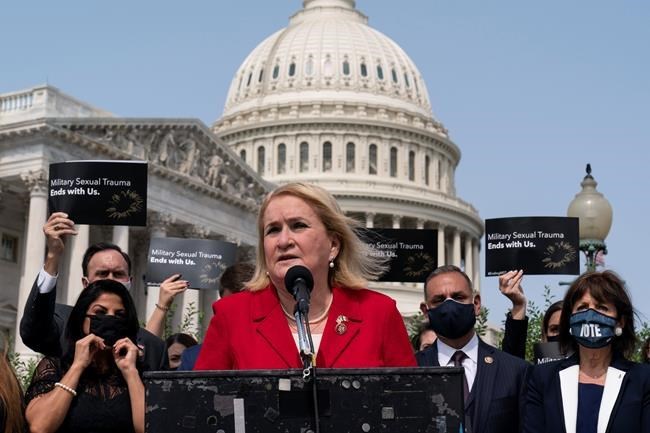
Rep. Sylvia Garcia, D-Texas, speaks during a news conference about the "I Am Vanessa Guillén Act," in honor of the late U.S. Army Specialist Vanessa Guillén, and survivors of military sexual violence, during a news conference on Capitol Hill, Wednesday, Sept. 16, 2020, in Washington. (AP Photo/Alex Brandon)
Republished September 16, 2020 - 4:32 PM
Original Publication Date September 16, 2020 - 11:06 AM
AUSTIN, Texas - Decisions on whether to prosecute members of the U.S. military for sexual assault or sexual harassment would be handled outside the chain of command under a measure members of Congress proposed Wednesday that is named for a Texas soldier who was slain by a fellow soldier.
Reps. Jackie Speier, a Democrat from California, and Markwayne Mullin, a Republican from Oklahoma, said their bill would make sexual harassment a crime within the Uniform Code of Military Justice. The bipartisan bill has at least 73 cosponsors.
Speier said that 20% of military service members are female, but that women make up more than 60% of victims in military cases of assault. She said younger women of lower rank were most at risk.
“The voices of those survivors have never been louder or more clear,” Speier said. “This is the military’s ‘me too’ moment.”
The “I Am Vanessa Guillen Act” is named after the hashtag that was used by military sexual assault survivors to denounce their experiences on social media when Spc. Vanessa Guillen went missing in April. According to a federal complaint, Guillen was bludgeoned to death at Fort Hood, near Killeen, Texas. Her body was found on July 1, when a fellow soldier, Spc. Aaron Robinson, was confronted by police and died by suicide.
Holding up sombre signs that read “Military Sexual Assault Ends With Us,” a coalition of military sexual assault survivors, the Guillen family and their attorney joined the House members to present the bill at the U.S. Capitol.
Guillen’s family has stated multiple times that Guillen was sexually harassed on the base by a fellow soldier, who they said was Robinson. According to Natalie Khawam, who represents the Guillen family, Guillen told her mother that a soldier of a higher rank walked in and watched her while she was showering.
U.S. Army officials said in July that they had found no evidence that Guillen had been sexually harassed by Robinson after Guillen did not formally file a report on the harassment. Officials said they had evidence that Guillen did face other kinds of harassment by other people at the Central Texas base.
In July, U.S. Army Secretary Ryan McCarthy ordered an independent review of command climate at Fort Hood and said the investigation into the harassment claims were ongoing. In August, McCarthy said Fort Hood had one of the highest rates of murder, sexual assault and harassment in the Army and in September ordered that the investigation into Guillen’s case be expanded to the command’s response from the day she went missing to the day she was found.
The bill is not slated to be attached to the National Defence Authorization Act for fiscal year 2021, which would authorize appropriations and sets policies for Department of Defence. Instead, House Speaker Nancy Pelosi said in a statement she would bring the legislation to a House vote as a stand-alone bill.
Military leaders would be mandated to launch command-directed investigations to be carried out by an independent investigator who is outside a victim’s chain of command if the bill becomes law.
However, independent investigations of sexual harassment would not go into effect for two years after the legislation became law. The delay is to give each branch of service time for for training on investigating complaints of sexual harassment.
The bill would also strip commanders — known as convening authorities in the military — from the decision to prosecute cases where a sexual offence is involved and give the authority to a uniformed chief prosecutor — similar to a district attorney in local government.
The Defence Department has historically been resolute in maintaining the authorities granted to a convening authority, arguing that it's a commander’s duty to maintain “good order and discipline” within their unit. Last year, the U.S. military’s top uniformed attorneys were staunch in their criticisms over passing legislation that would seek to remove a commander from the process of deciding whether to prosecute serious crimes like those involving sexual assault.
Lt. Gen. Charles Pede, the Army’s chief judicial officer, said last year on Capitol Hill, “Commanders have the moral and legal authority to drive the U.S. Army toward preventing significant crimes in a way that lawyers do not.”
Don Christensen, a retired Air Force colonel and president of Protect Our Defenders, a non-profit that advocates for military justice reform, told the AP in a phone interview on Tuesday that the Defence Department has a “nonsensical” and “illegitimate” argument over who gets to decide prosecutions.
“The ‘good order and discipline’ argument is the Pentagon’s go to for opposing any kind of reform," he said.
___
LaPorta reported from Delray Beach, Florida. Coronado is a corps member for the Associated Press/Report for America Statehouse News Initiative. Report for America is a non-profit national service program that places journalists in local newsrooms to report on undercovered issues.
News from © The Associated Press, 2020